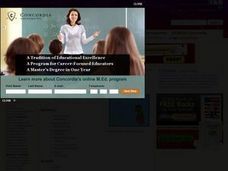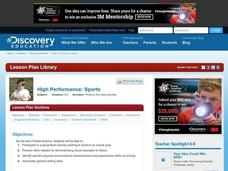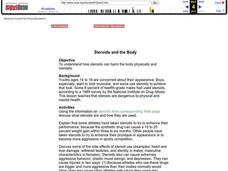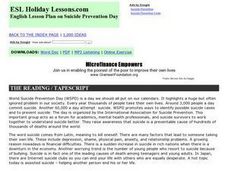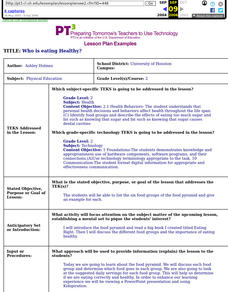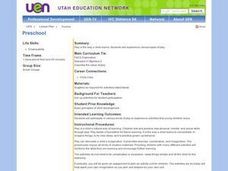Curated OER
20 Field Day Activities Any Kid Can Do (And Do Well!)
Students participate in activities in which they practice their physical skills. They work together on some of the activities to practice mental skills as well. They show their team spirit as the winners are announced.
Curated OER
Grade 11 and 12 - Personal Development (Mental Well-Being)
Young scholars relate emotional health and well-being to personal productivity and to the workplace design, implement, assess, and evaluate a plan to promote personal, school, and community well-being
Curated OER
Sports
Middle schoolers identify specific physical and emotional characteristics and experiences within an activity. They work in small groups. Students are introduced to different everyday objects. In their groups they choose from the...
Curated OER
Understanding MyPlate
Sixth graders recognize how using the food pyramid can add to their good health practices. In this food pyramid lesson plan, 6th graders build a 3-D food pyramid illustrating the desired amount of each food group.
Curated OER
Birds, Bees and STDs
Students develop knowledge on STD's, their causes, treatment and prevention. In this investigative lesson students mingle with each-other to find the STD, then get into groups and research STD's on the CDC site.
Curated OER
The Changing Me
Third graders study the human body. In this health lesson, 3rd graders discuss that everyone's body is growing, measure body parts using a tape measure, and color the body worksheet.
Florida Department of Health
Nutrition: Developing Healthy Habits Unit
The focus of the fourth unit in the Youth Risk Behavior Survey Curriculum is on healthy eating and exercise. Class members examine healthy habits data from the YRBD Youth Online Tool, learn about the importance of a healthy diet and...
Curated OER
Steroids and the Body
Students explore how steroids can harm the body physically and mentally.
Curated OER
ESL: World Suicide Prevention Day
Help to educate your ESL students about World Suicide Prevention Day with this series of activities. Matching key phrases, completing CLOZE paragraphs, and choosing appropriate words based on context clues are just a few of the many ways...
Curated OER
Developing Self Awareness.Community, and Exploring Personal Qualities
Older individuals just overcoming homelessness or drug abuse issues, engage in a practical lesson to boost self-awareness. They work through two hours of activities intended to aid them in gaining a self perspective while increasing...
Curated OER
Understanding Abuse
Students are introduced to the various forms of child abuse. Using the internet, they discover the proper ways to report abuse to adults and the warning signs of someone being abused. In groups, they complete a case study to end the lesson.
Florida Department of Health
Understanding the Risk of Substance Abuse Unit
Teenage brains are different! Understanding that the teenage brain is still developing and thus more impacted by substance abuse is the key concept in a three-lesson high school health unit. Participants learn about how the brain and...
Curated OER
Who Is Eating Healthy?
Second graders list the six food groups of the food pyramid and give an example for each. They discuss each food group and determine which food goes in each group. They examine the suggested daily servings for each food group and view a...
Curated OER
Healthy Living: How Does this Web Site Impact Medicare?
Students assess information on the Health Canada Web site and determine whether such information should be paid for with tax dollars, and whether the publication of such information has an impact on Medicare.
Curated OER
Preschool
Students experience various types of play. They determine play is the way a child learns and describe the value of play. They discover that play is a child's natural way of learning and that children test and practice new physical,...
Curated OER
FACS: Recreation Therapy
An attractive and informative nine-slide PowerPoint introduces the class to the world of recreational therapy. Attached handouts provide team-building and ice-breaker activities. The activities are engaging. They serve as examples of...
Curated OER
Out of Sight, Out of Mind
High schoolers examine conditions at state mental hospitals after World War II. They examine the treatment of patients and how to evaluate the credibility of sources. They write a short essay to complete the activity.
Curated OER
Eating Well and Keeping Fit
Learners look at statistics that show children who are overweight are increasing in our society. Students chart out ways to be physically active and how to eat a balanced diet. Learners devise a menu/activity chart in light of what has...
Project B.A.S.I.C. Child Development Specialist and Child Care Consultation
Better Attitudes and Skills in Children
Little kids often have very big feelings, and need help expressing them. A set of social emotional lessons provide tangible ways for young elementary learners to visualize their emotions, focus on clear communication, and channel their...
Curated OER
Get Your Calcium-Rich Foods
Sixth graders explore foods in the dairy group. In this dairy food lesson, 6th graders examine the nutritional value of dairy foods and determine the proper number of dairy servings per day. Students also evaluate numerous food labels of...
Curated OER
Staying Healthy Year Round
Students are read a variety of books and observe the weather in the different seasons. In groups, they compare and contrast the type of activities people are doing. They also discuss how they adapt to the changes in seasons by the...
Curated OER
Benefits of Cycling
Fourth graders discuss cycling and create a list of good effects from cycling. In this cycling lesson, 4th graders design a leaflet or poster to encourage cycling. Students debate the benefits of cycling.
Curated OER
Respecting Others
Learners discuss the meaning of the words respect and disrespect and record examples of respectful things that others do. They work cooperatively in groups to achieve a goal of a popcorn party.
Curated OER
Self Acceptance
Students explore their own self concept. They draw a picture of themselves, read a story, and write a story that has a character like themselves. Afterward, they write and illustrate their stories in PowerPoint.


